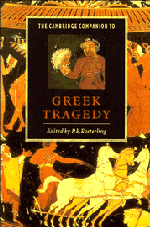1 - ‘Deep plays’: theatre as process in Greek civic life
from Part I - Tragedy as an institution
Published online by Cambridge University Press: 28 May 2006
Summary
LIFE IMITATES ART?
Theatre as we understand it in the West today was invented in all essentials in ancient Greece, and more specifically in classical Athens. In Athens, however, theatre was always a mass social phenomenon, considered too important to be left solely to theatrical specialists or even confined to the theatres to be found both in the centre of Athens itself and in some of the constituent demes (villages or wards) of the surrounding civic territory of Attica. Athenian tragic drama did not have merely a political background, a passive setting within the polis, or city, of the Athenians. Tragedy, rather, was itself an active ingredient, and a major one, of the political foreground, featuring in the everyday consciousness and even the nocturnal dreams of the Athenian citizen.
This was especially the case after the establishment of an early form of democracy at Athens, the world's first such polity, towards the end of the sixth century BC, although some kind of tragic drama seems to have been developed and officially recognised several decades earlier during the relatively benign and populist rule of the aristocratic dictator Peisistratus (c. 545-528). Indeed, democratic Athenian political life in the fifth and fourth centuries was also deeply theatrical outside the formally designated theatrical spaces. Not only did the Athenians theatricalise their ordinary experience through ritual dramas of everyday life, in the manner of the African Ndembu studied by Victor Turner. There was a formal analogy or even identity between their experience inside and that outside the theatre, most notably in the performance of the constitutive communal ritual of animal blood-sacrifice.
- Type
- Chapter
- Information
- The Cambridge Companion to Greek Tragedy , pp. 3 - 35Publisher: Cambridge University PressPrint publication year: 1997
- 51
- Cited by

